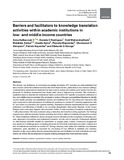| dc.contributor.author | Kalbarczyk, Anna | |
| dc.contributor.author | Rodriguez, Daniela C | |
| dc.contributor.author | Mahendradhata, Yodi | |
| dc.contributor.author | Sarker, Malabika | |
| dc.contributor.author | Seme, Assefa | |
| dc.contributor.author | Majumdar, Piyusha | |
| dc.contributor.author | Akinyemi, Oluwaseun O | |
| dc.contributor.author | Kayembe, Patrick | |
| dc.contributor.author | Alonge, Olakunle O | |
| dc.date.accessioned | 2022-06-21T04:42:40Z | |
| dc.date.available | 2022-06-21T04:42:40Z | |
| dc.date.copyright | 2021 | |
| dc.date.issued | 2021-03-01 | |
| dc.identifier.citation | Kalbarczyk, A., Rodriguez, D. C., Mahendradhata, Y., Sarker, M., Seme, A., Majumdar, P., . . . Alonge, O. O. (2021). Barriers and facilitators to knowledge translation activities within academic institutions in low- and middle-income countries. Health Policy and Planning, 36(5), 728-739. doi:10.1093/heapol/czaa188 | en_US |
| dc.identifier.uri | http://hdl.handle.net/10361/17007 | |
| dc.description | This article was published in the Health Policy and Planning by Oxford Academic [VC The Author(s) 2021. Published by Oxford University Press in association with The London School of Hygiene and Tropical Medicine.] and the definite version is available at: https://doi.org/10.1093/heapol/czaa188 The Journal's website is at: https://academic.oup.com/heapol/article/36/5/728/6154488 | en_US |
| dc.description.abstract | The barriers and facilitators of conducting knowledge translation (KT) activities are well-established but
less is known about the institutional forces that drive these barriers, particularly in low-resource settings.
Understanding organizational readiness has been used to assess and address such barriers but the employment of readiness assessments has largely been done in high-income countries. We conducted a
qualitative study to describe the institutional needs and barriers in KT specific to academic institutions in
low- and middle-income countries. We conducted a review of the grey and published literature to identify
country health priorities and established barriers and facilitators for KT. Key-informant interviews (KII)
were conducted to elicit perceptions of institutional readiness to conduct KT, including experiences with
KT, and views on motivation and capacity building. Participants included representatives from academic
institutions and Ministries of Health in six countries (Bangladesh, Democratic Republic of the Congo,
Ethiopia, India, Indonesia, Nigeria). We conducted 18 KIIs, 11 with members of academic institutions and
7 with policymakers. KIIs were analysed using a deductive and inductive coding approach. Our findings
support many well-documented barriers including lack of time, skills and institutional support to conduct
KT. Three additional institutional drivers emerged around soft skills and the complexity of the policy process, alignment of incentives and institutional missions, and the role of networks. Participants reflected
on often-lacking soft-skills needed by researchers to engage policy makers. Continuous engagement
was viewed as a challenge given competing demands for time (both researchers and policy makers) and
lack of institutional incentives to conduct KT. Strong networks, both within the institution and between
institutions, were described as important for conducting KT but difficult to establish and maintain.
Attention to the cross-cutting themes representing barriers and facilitators for both individuals and institutions can inform the development of capacity building strategies that meet readiness needs. | en_US |
| dc.language.iso | en_US | en_US |
| dc.publisher | Oxford Academic | en_US |
| dc.relation.uri | https://academic.oup.com/heapol/article/36/5/728/6154488 | |
| dc.subject | Knowledge translation | en_US |
| dc.subject | Organizational readiness | en_US |
| dc.subject | Capacity building | en_US |
| dc.subject | Motivation | en_US |
| dc.title | Barriers and facilitators to knowledge translation activities within academic institutions in low- And middle-income countries | en_US |
| dc.type | Journal Article | en_US |
| dc.description.version | Published | |
| dc.contributor.department | Brac James P. Grant School of Public Health | |
| dc.identifier.doi | https://doi.org/10.1093/heapol/czaa188 | |
| dc.relation.journal | Health Policy and Planning | |

